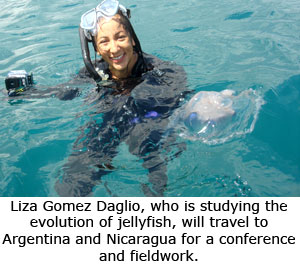

Even during summer break, UC Merced’s world-class
facultymembers and students remain busy going to remote areas for research, participating in conferences, writing papers for publication and continuing to work on projects.
The summer provides a great opportunity for students and faculty members to travel to areas across the world that would otherwise be too far to reach during the school year. Summer break began May 17 and will continue through Aug. 24, when regular instruction begins again.
The following is a sampling of what UC Merced’s professors and students are doing this summer.
School of Engineering
Two undergraduate
engineeringstudents working in Professor
Carlos Coimbra’slab, David Larson and Joshua Gonzales, have two solar-related projects on their plates this summer. The first was to install a cloud tracker on UC Merced’s solar pad, which will help in predicting how much power output can be expected from the
solar array. The tracker was installed earlier this month.
“The cloud tracker would be very useful in predicting the output of our solar array and would allow us to intelligently control energy usage on campus,” Gonzales said. “Since electrical energy cannot be stored, solar power needs to be reliable and predictable if it ever becomes a major part of the central grid.”
In addition, Larson and Gonzales will also be testing the effectiveness of various protective, dust-repellant coatings for the solar panels themselves. Gonzales said the research on that project could take several months.
School of Social Sciences, Humanities and Arts
Jan Goggans, a literature professor in the
School of Social Sciences, Humanities and Arts, will be traveling to Washington, D.C., to spend two weeks viewing studio films, shorts and newsreels from the 1920s and 1930s. She will also go to New York to visit the Fashion Institute of Technology and a new exhibit at the Metropolitan Museum of Art, “American Woman: Fashioning an American Identity.”
UC Merced’s
Graduate and Research Counciland the
Center for Research in the Humanities and Artsis supporting the travel, which will allow Goggans to build on work she is doing for her second book, which will explore fashion and class in literature and films of the Great Depression.
Robin DeLugan’sresearch with
Simón Wefferinto the communities of Planada and South Merced will continue through the summer. They’re looking at community cohesion, efficacy and civic engagement as it relates to health disparities and other inequities. DeLugan will also be working on a book manuscript, “Re-Imagining National Belonging: Post-Civil War El Salvador in a Global Context.” Weffer will be continuing his research on protest in Chicago as well as around immigration and California’s Proposition 8.
Literature Professors
Ignacio López-Calvoand
Cristián Ricciwill attend the National Endowment for the Humanities’ summer seminar in Sao Paulo, “Brazilian Literature: Contemporary Urban Fiction.”
School of Natural Sciences
Several students from
School of Natural SciencesProfessor
Michael Dawson’slab will be going abroad for fieldwork or conferences.
Vera Diaz, who just graduated, is going to France for a conference with the help of a scholarship she has received. Graduate student Liza Gomez Daglio will travel to Argentina and Nicaragua for a conference and fieldwork.
Diaz and Gomez Daglio are studying the evolution of jellyfishes. One aspect of their work includes using molecular and morphological tools to determine differences between populations of Cannonball jellyfish that are commercially fished to try to help prevent overfishing.
Graduate student Sharon Patris will travel to Palau for fieldwork. She’s studying the distributions of species among marine lakes, the impacts of invasive species and how much swimming organisms mix the seas.
Rudy Ortiz, a professor in the School of Natural Sciences, and three of his undergraduate students are spending time Japan for research supported by the
Minority Health and Health Disparities International Research Training Program(MHIRT).
Jacqui Minas, who graduated last year, and Ruben Rodriguez will be in Japan for 20 weeks. For the second time, Rodriguez received a MHIRT grant, allowing him to research in Japan. Jennifer Aguil will stay there for 10 weeks.
The program is meant to help build a cadre of biomedical, behavioral and social science researchers working toward reducing the disparate health burdens among the United States’ underserved populations. The students’ work in metabolic syndrome is in collaboration with pharmacology department chair Akira Nishiyama and Professor Daisuke Nakano at the Kagawa Medical School in Japan.
Ortiz is also leading the undergraduate research-training program, part of the
Center of Excellence for the Study of Health Disparities in Rural and Ethnic Underserved Populations.
After a school year spent teaching, grading, attending committee meetings and such, summer is a time for faculty to catch up and focus on their research while giving students a chance to gain hands-on experience across the world.






